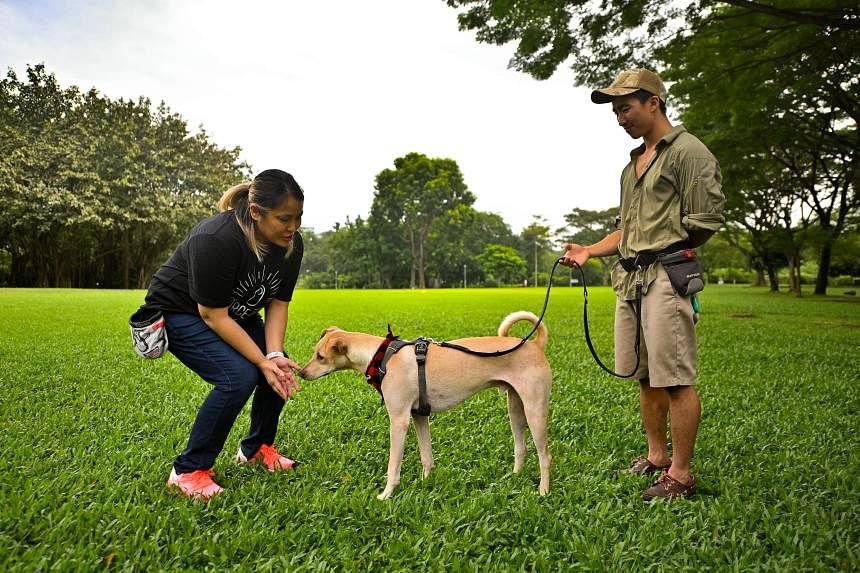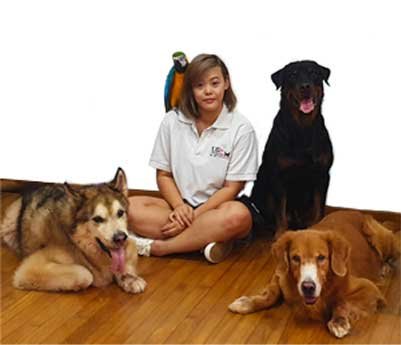Table of Contents
Are you passionate about dogs and have a knack for training them? Well, Singapore is currently offering multiple exciting job opportunities for dog trainers! With the increasing popularity of pet ownership, the demand for professional trainers has skyrocketed in the city. Whether you are a seasoned professional or just starting out in the field, there are various dog trainer job positions available in Singapore. Join this thriving industry and help transform the lives of countless canine companions while doing what you love. From obedience training to behavioral correction, these positions offer a rewarding career for individuals who are dedicated to the welfare of our furry friends. Embark on a new adventure and make a difference in the lives of dogs in Singapore!

Requirements for Dog Trainer Jobs in Singapore
To become a dog trainer in Singapore, there are certain requirements that you need to meet. These requirements include educational qualifications, certifications and training, experience, as well as special skills and abilities.
Educational qualifications
While there is no specific educational requirement to become a dog trainer in Singapore, having a background in animal science or a related field can be advantageous. A degree or diploma in veterinary science, animal behavior, or animal psychology can provide you with a solid foundation of knowledge and understanding of dogs and their behavior.
Certifications and Training
Obtaining certifications and undergoing training programs can greatly enhance your credibility and marketability as a dog trainer. There are various certification programs available, such as the Certified Professional Dog Trainer (CPDT) certification from the Certification Council for Professional Dog Trainers (CCPDT), the Animal Behavior College (ABC) Dog Trainer Certification, or the International Association of Canine Professionals (IACP) Certified Dog Trainer certification.
Experience
Most dog trainer jobs in Singapore require some level of hands-on experience with dogs. This can be gained through volunteering at animal shelters, working at doggie daycares or pet boarding facilities, or assisting established dog trainers. The more experience you have working with different breeds and behaviors, the more attractive you will be to potential employers.
Special Skills and Abilities
Being a dog trainer requires certain special skills and abilities. Firstly, you need to have a deep understanding of dog behavior and psychology. This includes understanding how dogs communicate, their learning processes, and how to modify and shape their behavior effectively. Additionally, you should have excellent communication and interpersonal skills, as you will be working with both dogs and their owners. Patience, empathy, and a genuine love for animals are also important qualities that will make you a successful dog trainer.
Types of Dog Trainer Positions
There are several types of dog trainer positions available in Singapore. Each position may have different requirements and responsibilities, catering to various aspects of dog training and behavior modification.
Private Dog Trainer
Private dog trainers work with individual dogs and their owners to address specific behavior issues or teach basic obedience commands on a one-on-one basis. This type of trainer often provides personalized training programs tailored to the dog’s needs and the owner’s goals.
Group Dog Trainer
Group dog trainers conduct training classes for multiple dogs and their owners. These classes usually focus on basic obedience, socialization, and problem-solving in a group setting. Group trainers need to have excellent communication skills and the ability to manage and control multiple dogs and their owners simultaneously.
Shelter Dog Trainer
Shelter dog trainers work with dogs in animal shelters or rescue organizations, helping them become more adoptable by addressing behavior issues, socializing them, and teaching basic manners. This type of trainer often works with dogs that have had a difficult past and require extra patience and understanding.
Service Dog Trainer
Service dog trainers are responsible for training dogs to assist individuals with disabilities or special needs. This can include tasks such as guiding the visually impaired, alerting individuals with hearing impairments, or providing support for individuals with mobility challenges. Service dog trainers need to have a strong understanding of disability-related laws and regulations, as well as the ability to select and train dogs for specific tasks.
Police/Military Dog Trainer
Police and military dog trainers train and handle dogs for law enforcement or military purposes. These highly skilled trainers are responsible for teaching dogs specialized tasks such as searching for narcotics or explosives, tracking suspects, or apprehending individuals. This type of training requires a blend of obedience, agility, and advanced skills.
Guide Dog Trainer
Guide dog trainers specialize in training dogs to assist individuals with visual impairments. These trainers teach dogs to guide their handlers safely, avoid obstacles, and navigate various environments. Guide dog training requires a high level of skill and expertise, as well as a strong understanding of the challenges faced by individuals with visual impairments.
Behaviourist Dog Trainer
Behaviourist dog trainers focus on addressing complex behavioral issues and modifying problem behaviors in dogs. These trainers have an in-depth understanding of dog psychology and behavior, and are skilled at developing and implementing behavior modification plans to help dogs overcome fear, aggression, or anxiety-related issues.
Agility Dog Trainer
Agility dog trainers specialize in training dogs for agility competitions and events. They teach dogs to navigate through obstacle courses, perform jumps, tunnels, and weave poles with speed and accuracy. Agility dog training requires a combination of obedience, athleticism, and problem-solving skills.
Therapy Dog Trainer
Therapy dog trainers work with dogs that are trained to provide comfort, companionship, and emotional support to individuals in various settings such as hospitals, nursing homes, and schools. These trainers focus on training dogs to be calm, well-behaved, and responsive to different environments and situations.
Responsibilities of a Dog Trainer
Dog trainers have a range of responsibilities, which may vary depending on their specific role and the type of dogs they work with. Some common responsibilities include:
Assessing dog behavior and training needs
As a dog trainer, your first responsibility is to assess the behavior and training needs of the dog you are working with. This involves observing the dog’s behavior, identifying any problem areas or behavioral issues, and determining the appropriate training methods and techniques to address them.
Developing training programs and sessions
Once you have assessed a dog’s training needs, you are responsible for developing a training program or session plan. This includes setting specific goals, outlining the training exercises and activities, and determining the appropriate timeline and progression of training.
Teaching basic commands and obedience
A significant part of a dog trainer’s role is teaching dogs basic obedience commands and manners. This may include commands such as sit, stay, down, come, and walking nicely on a leash. It also involves teaching dogs to respond reliably to their owners’ cues and commands.
Addressing behavioral issues
Many dogs may have behavioral issues that need to be addressed, such as aggression, separation anxiety, or fearfulness. Dog trainers are responsible for identifying and addressing these behavioral issues through training and behavior modification techniques.
Evaluating progress and adjusting training techniques
Throughout the training process, it is essential to evaluate the progress of both the dog and the owner. Dog trainers need to assess the effectiveness of their training techniques and make necessary adjustments or modifications to ensure the best results.
Educating dog owners on proper handling and care
In addition to training dogs, dog trainers also play a crucial role in educating dog owners on proper handling, care, and management techniques. This includes teaching owners about positive reinforcement training methods, proper nutrition, exercise requirements, and other aspects of responsible dog ownership.
Conducting group classes or one-on-one sessions
Depending on their specific position, dog trainers may conduct group classes or work with dogs and owners individually. In group classes, they have the responsibility to manage and control multiple dogs and their owners, ensuring a safe and productive learning environment.
Monitoring and assisting during training exercises
During training sessions, dog trainers need to closely monitor dogs and their responses to different exercises and activities. They should provide guidance and assistance as needed to ensure that dogs are learning and progressing in a positive and safe manner.
Providing ongoing support and guidance
Even after formal training sessions have ended, dog trainers often provide ongoing support and guidance to dog owners. This may include answering questions, addressing concerns, and providing additional training resources or recommendations.
Salary and Benefits for Dog Trainer Positions
The salary and benefits for dog trainer positions in Singapore can vary depending on factors such as experience, qualifications, and the specific employer. However, here are some general aspects to consider:
Salary range
The salary range for dog trainers in Singapore typically starts from around SGD 2,000 per month for entry-level positions and can go up to SGD 6,000 or more for highly experienced and specialized trainers.
Commission or incentive opportunities
Some dog trainer positions offer commission or incentive opportunities, where trainers can earn additional income based on factors such as the number of clients served or the success of their training programs.
Health insurance
Certain dog training companies or organizations may provide health insurance benefits to their trainers, ensuring that they have access to medical care and support.
Paid time off
Paid time off, including vacation days and sick leave, may be provided by certain employers to allow dog trainers to take breaks and attend to personal matters.
Flexible working hours
Dog training often involves working outside of traditional office hours, including evenings and weekends. However, this flexibility allows trainers to work with clients who may have busy schedules or require training at specific times.
Professional development opportunities
Some employers may offer professional development opportunities, such as attending workshops, seminars, or industry conferences, to help trainers enhance their skills and knowledge.

Where to Find Dog Trainer Jobs in Singapore
If you are interested in pursuing a career as a dog trainer in Singapore, there are several places where you can find job opportunities. Some common avenues to explore include:
Online job portals
Popular online job portals in Singapore, such as Indeed, JobsDB, or LinkedIn, often have listings for dog trainer positions. These portals allow you to search for jobs based on specific criteria, such as location, experience level, or job type.
Pet care and training companies
Many pet care and training companies in Singapore hire dog trainers to provide services to their clients. These companies often have established training programs and a steady flow of clients, providing trainers with ample opportunities to gain experience and work with a variety of dogs.
Veterinary clinics and hospitals
Veterinary clinics and hospitals may hire dog trainers to provide behavior and obedience training services as part of their overall pet care offerings. Working in a veterinary setting allows trainers to collaborate closely with veterinarians and provide holistic care to dogs and their owners.
Animal shelters and rescue organizations
Animal shelters and rescue organizations often have a need for dog trainers to help rehabilitate and train dogs before they are adopted. These positions can be particularly rewarding for trainers who have a passion for working with dogs in need.
Dog training centers and schools
Specialized dog training centers and schools in Singapore often hire trainers to teach classes, conduct private sessions, or assist with training programs. These establishments may focus on various aspects of dog training, such as obedience, agility, or behavioral modification.
Top Dog Trainer Employers in Singapore
If you are looking for reputable and well-established dog trainer employers in Singapore, consider the following:
Pet Movers Singapore
Pet Movers Singapore offers a range of pet relocation and pet care services, including dog training. They have a team of experienced trainers who provide personalized training programs to suit individual dog and owner needs.
Pawsitive Sensations
Pawsitive Sensations is a dog training company in Singapore that specializes in behavior modification and obedience training. They have a team of certified trainers who work with both private clients and organizations.
National Dog Training Academy
The National Dog Training Academy provides professional dog trainer education and certification programs. They offer a comprehensive curriculum and hands-on training opportunities to aspiring dog trainers.
Pets Eden
Pets Eden is a pet care and training company that offers various services, including dog training. They have a team of trainers who provide group classes, private sessions, and behavior consultations.
Institute of Technical Education
The Institute of Technical Education (ITE) in Singapore offers a course in Animal Management and Veterinary Science, which includes an emphasis on dog training and behavior. Graduates of this program often find employment as dog trainers in various settings.
Singapore Police Force K-9 Unit
The Singapore Police Force K-9 Unit hires dog trainers to train and handle police dogs. These trainers are responsible for training the dogs in specialized tasks such as bomb detection, tracking, and crowd control.
Guide Dogs Singapore Ltd
Guide Dogs Singapore Ltd is an organization that specializes in training guide dogs for individuals with visual impairments. They employ guide dog trainers to select and train dogs for this important role.

Steps to Become a Dog Trainer
If you aspire to become a dog trainer in Singapore, here are some steps you can take to pursue this rewarding career:
Gaining relevant education and qualifications
Consider pursuing a degree or diploma in a field related to animal science, animal behavior, or animal psychology. This will provide you with a solid foundation of knowledge and understanding of dogs and their behavior.
Obtaining certifications or professional memberships
Obtaining certifications or professional memberships from reputable organizations such as the Certification Council for Professional Dog Trainers (CCPDT) or the International Association of Canine Professionals (IACP) can enhance your credibility and marketability as a dog trainer.
Gaining hands-on experience with dogs
Volunteering at animal shelters, working at pet boarding facilities, or assisting established dog trainers can provide you with valuable hands-on experience with dogs. This experience will help you develop your skills and gain a deeper understanding of dog behavior and training techniques.
Building a professional portfolio
As you gain experience, it’s important to build a professional portfolio showcasing your skills, qualifications, and past work. This can include videos, testimonials, and case studies of dogs you have trained.
Networking and gaining connections in the industry
Networking is crucial in the dog training industry. Attend dog-related events, join professional associations, and connect with other trainers or professionals in the field. Building relationships and gaining connections can lead to job opportunities and mentorship.
Continuing education and professional development
Stay up to date with the latest advancements in dog training techniques and theories by attending workshops, webinars, or seminars. Continuing education shows your commitment to the field and can help you stay competitive in the job market.
Challenges and Rewards of Being a Dog Trainer
Being a dog trainer comes with its own set of challenges and rewards. Here are some aspects to consider:
Working with difficult or aggressive dogs
One of the biggest challenges of being a dog trainer is working with difficult or aggressive dogs. Dealing with fear, aggression, or anxiety in dogs requires patience, skill, and the ability to read and understand their body language.
Dealing with uncooperative owners
Sometimes, dog owners may not be fully cooperative or receptive to training techniques. Effective communication and interpersonal skills are essential to navigate these situations, educate the owners, and find solutions.
Physical demands and potential injuries
Dog training can be physically demanding, especially when working with larger or more energetic breeds. Trainers may need to be prepared for physical tasks such as walking, running, and managing dogs in various environments. Additionally, trainers are at risk of potential injuries, such as bites or falls.
Building strong bonds with dogs
One of the most rewarding aspects of being a dog trainer is the opportunity to build strong bonds with dogs. Seeing a dog progress, overcome behavioral challenges, and form a trusting relationship with their trainer is incredibly fulfilling.
Making a positive impact on dog and owner relationships
As a dog trainer, you have the ability to make a positive impact on the relationship between dogs and their owners. Teaching dogs obedience and manners improves their quality of life and strengthens the bond they share with their owners.
Flexible and rewarding career
Being a dog trainer offers a flexible and rewarding career. You have the opportunity to work with dogs every day, help them overcome challenges, and play a role in improving their overall well-being.
Opportunity to help dogs in need
For trainers working with shelter dogs or in organizations that provide assistance dogs, there is a unique opportunity to make a difference in the lives of dogs in need. Helping dogs find their forever homes or assisting individuals with disabilities through trained dogs can be incredibly fulfilling.

Job Outlook for Dog Trainers in Singapore
The job outlook for dog trainers in Singapore is positive, with several factors contributing to the growing demand for trained dogs and the need for professional trainers:
Growing demand for trained dogs
There is an increasing demand for trained dogs in Singapore, both in pet homes and in specialized settings such as service dogs or therapy dogs. People are recognizing the benefits of having a well-behaved and obedient dog, which has led to a higher demand for professional dog trainers.
Increased awareness of dog training benefits
More pet owners are becoming aware of the benefits of investing in professional dog training. Properly trained dogs are happier, healthier, and easier to manage, creating a positive impact on their overall well-being and the relationship with their owners.
Expanding pet industry
The pet industry in Singapore is expanding rapidly, with an increasing number of pet-related businesses and services. This growth creates a need for skilled professionals, such as dog trainers, to cater to the demands of pet owners.
Potential for career advancement
As a dog trainer, there are opportunities for career advancement and specialization. With additional experience, certifications, and professional development, trainers can take on more advanced roles or specialize in specific areas of dog training, such as working with service dogs, behavior modification, or competition-level training.
Conclusion
Dog trainer jobs in Singapore offer a wide range of opportunities for individuals who are passionate about dogs and have the necessary skills and qualifications. Whether you choose to work as a private dog trainer, specialize in guide dog training, or work with dogs in law enforcement, there are various paths to explore in this rewarding career. The growing demand for trained dogs and the increasing awareness of the importance of proper dog training provide a positive job outlook for dog trainers in Singapore. By acquiring the required education, certifications, and experience, and by continuously improving your skills and knowledge, you can embark on a fulfilling and successful career as a dog trainer in Singapore.




